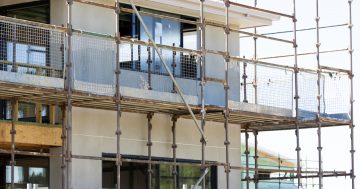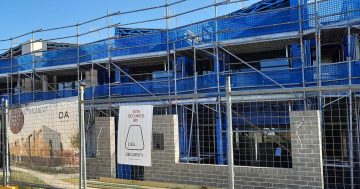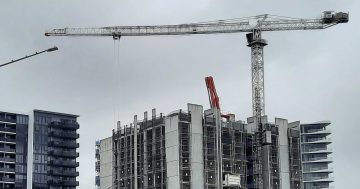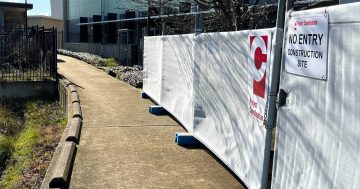
Voyager Projects’ $57 million apartment and townhouse development in Googong. Image: DNA Architects.
Another Canberra builder has gone under, the second in two weeks to call in administrators.
According to ASIC, family-owned and operated Voyager Projects resolved last week to wind the company up and appointed Michael Slaven of Slaven Torline as liquidator.
Since 2010, the Naylor family’s Voyager Projects has been building residential developments, delivering commercial fit-outs and refurbishments, and managing projects in and around Canberra.
Last year, it lodged plans with the Queanbeyan Palerang Regional Council for a $57 million, six-building residential complex of 138 dwellings in Googong, within walking distance of the future Town Centre.
It is not known how many projects may be affected and the liquidator has not issued any statement detailing the number of creditors or amount owed or responded to Region questions.
Voyager’s managing director is Peter Naylor, Brett Naylor is general manager and Aaron Naylor construction manager.
Company records show that sole directors and shareholders are Peter William Naylor and Julie Anne Naylor of Macarthur.
The company has not issued any statement, and its website has been taken down.
Voyager’s demise follows that of 50-year-old Project Coordination whose directors called in administrators after failing to secure finance despite a strong pipeline of work.
Project Coordination faced escalating labour, material and borrowing costs while working on fixed-price contracts.
Tighter lending policies have exacerbated the environment in which builders and developers are operating.
An ACT Government spokesperson said Chief Minister Andrew Barr would meet with Master Builder ACT representatives next week after CEO Michael Hopkins wrote to him on Tuesday requesting an urgent meeting.
The spokesperson said the best thing the government could do was provide certainty in the market by having a healthy pipeline of work.
However, on Friday, Mr Hopkins told Region that government regulation was not helping in the current challenging economic environment.
“Our industry is currently experiencing an unprecedented economic and regulatory environment, which is adding considerable stress to small local building and construction businesses,” he said.
“We have been reminding governments at all levels about the pressures being experienced by our industry since COVID lockdowns ended; however, we are concerned that the ACT Government’s reform program, which was determined before these conditions emerged, hasn’t responded to industry feedback.”
Mr Hopkins said one example was the new ACT security of payments laws, which commenced this month.
He said they were unworkable, out of step with other jurisdictions and introduced without industry consultation.
“Even the ACT Government’s own Directorates aren’t complying with new payment timeframes,” he said.
“Every new regulation adds cost, impacts productivity and adds to the stress that small local businesses are currently feeling.
“We hope that all governments will listen to our feedback and engage more closely with those businesses impacted by new regulations before they are finalised.”
Mr Hopkins said ASIC data released this week showed that there has been a 54.5 per cent increase in ACT building and construction companies entering external administration over the year to February 2024.
“Every time a company enters administration it is the staff, subcontractors and suppliers who feel the most pain,” he said.
“Any subcontractor or supplier impacted by the most recent business closures should contact the administrators for guidance. The MBA will be assisting and supporting all of our members through this difficult trading period.”
The Property Council has also said that the proposed developer licensing bill, as it stands, would only worsen the industry’s situation.




















